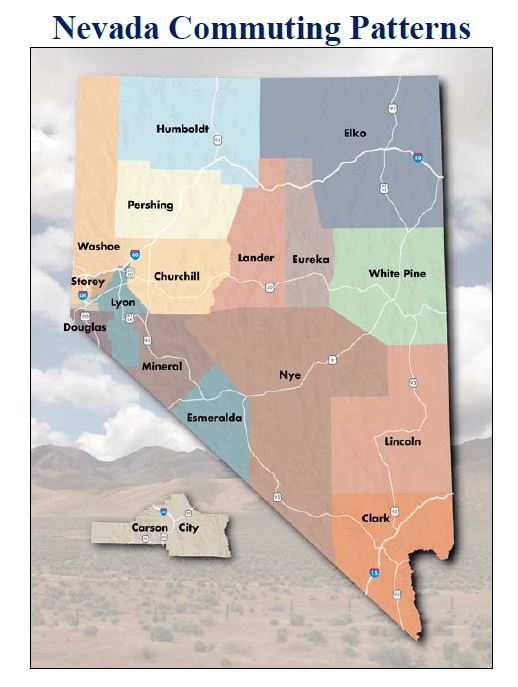Latest News
All the news that is relevant for the WNDD Region
A virtual discussion on the region’s Economic Challenges and Opportunities!
Tahoe Rising is a three-part virtual event to catalyze change and take action for the benefit of Lake Tahoe’s regional community and economy. Join the Tahoe Prosperity Center as it presents keynote speakers from around the country and the Lake who will discuss challenges facing Lake Tahoe in this current pandemic; sharing economic, community and environmental perspectives.
The fast-paced program includes panel sessions with those experts combined with local Tahoe leaders that will enhance these conversations. Collaborative and interactive group sessions will follow and provide an opportunity to share solutions that can be implemented locally to improve the region and build a resilient community.
The Tahoe Prosperity Center is an Associate Member of the Western Nevada Development District.
Event Schedule:
September 30th
10:00 am till 12:00 pm
Topic: Tahoe’s Economic Picture
October 14th
10:00 am till 12:00 pm
Topic: Tahoe’s Economic Recovery
October 28th
10:00 am till 12:00 pm
Topic: Tahoe’s Economic Resiliency
 Supporting Small Businesses Financially Impacted by COVID-19
Supporting Small Businesses Financially Impacted by COVID-19
A partnership between NACO and the counties of: Douglas, Elko, Lincoln, Lyon, Nye, Storey, Washoe and White Pine
Eight counties across Nevada have partnered with the Nevada Association of Counties (NACO) to develop a grant program to support small businesses financially impacted by COVID-19. This grant program is being supported by federal CARES Act Coronavirus Relief Funds. Eligible businesses must be located in Douglas, Elko, Lincoln, Lyon, Nye, Storey, unincorporated Washoe or White Pine counties.
Eligible Grant Uses include:
• Personal Protective Equipment (PPE)
• Protective Retrofits
• Working capital – including utilities, payroll not covered by PPP, inventory etc.
Grant awards range from $1,500 to $20,000.
Applications are open September 8 thru October 6, 2020.
The Nevada Small Business Development Center is partnering with NACO to provide help to businesses that may need it.
Request free and confidential assistance by calling 800-240-7094 to make an appointment with a counselor through one of their 13 statewide locations.
 Michael Dominguez and Thomas R. Harris have just released a technical report containing valuable data on Commuting Patterns in Nevada.
Michael Dominguez and Thomas R. Harris have just released a technical report containing valuable data on Commuting Patterns in Nevada.
Michael Dominquez is a Research Associate at the University Center for Economic Development at the University of Nevada, Reno, and Thomas R. Harris is a Professor in the Department of Economics and Director of the University Center for Economic Development at the University of Nevada, Reno.
The report contains statistical data, by county, on where residents live vs work, number of households, median income, percentage of households with a computer, percentage of households with broadband internet, annual unemployment rates, and education levels.
Download the complete document here: Nevada Commuting Patterns
 Economic Recovery Coordinator
Economic Recovery Coordinator
Two Positions Available!
BACKGROUND:
Western Nevada Development District (WNDD) is recruiting for two Economic Recovery Coordinator positions. Funds for this position are from a two-year (24 MONTH) Economic Development Administration grant under the CARES Act. These funds are intended to provide assistance to communities to respond to the economic shock sustained as a result of the Coronavirus-19 pandemic. Coordinators will be deployed in communities within the seven county, five cities and tribal community located within the region.
DESCRIPTION: The Economic Recovery Coordinator will support, carry out and serve as a project/program coordinator for economic development planning and implementation activities related to the development of plans, projects and programs for the WNDD region. Serving as a liaison and coordinator for the businesses, government, tribal, educational and nonprofit communities, support and assistance will be provided as local economies recover from the economic shock sustained as a result of the COVID-19 pandemic. This will include facilitation of the region’s efforts to identify and develop strategies to create and build a more resilient economy; working for the purpose of revitalizing, expanding, and upgrading distressed communities’ environment to attract industry, encourage business retention, expansion and recruitment and generate long-term sustainable private sector jobs and investments, strengthened recovery and resiliency.
DOWNLOAD FULL JOB DESCRIPTION!
PAY and BENEFITS:
Pay: $55,000 to $60,000
Benefits: Dental, vision insurance
Health insurance reimbursement $450 per month
Retirement Plan
Paid Time Off
Holidays
WORK HOURS: Monday to Friday – 8 am to 5 pm
COVID-19 Considerations: Employer strictly observes social distancing requirements and the wearing of a mask in a secure environment. Employee will have a private workspace.
How to Apply: Send cover letter, résumé and three references to Sheryl Gonzales at sgonzales@wndd.org.
Deadline to apply: Friday, July 31, 2020 at 12 noon.
 Building Post-Pandemic Workforce and Community Resiliency
Building Post-Pandemic Workforce and Community Resiliency
The Economic Development Administration (EDA) of the Department of Commerce has awarded $400,000 to the Western Nevada Development District (WNDD) to help respond to the coronavirus pandemic and drive economic development planning going forward.
As part of EDA’s CARES Act Recovery Assistance, this supplemental financial assistance award will help WNDD’s 12 local government, non-profit and educational community members respond to the unusual and compelling urgency of the coronavirus pandemic.
WNDD President Roy Edgington, Mayor of the City of Fernley, announced the receipt of the $400,000 EDA grant, stating: “The Western Nevada Development District is pleased to have received these funds to support our communities in the engagement of strategies that will diversify our regional economy, support workforce training aligned to careers post pandemic and to build economic resiliency for the future.”
The award’s scope of work requires the recipient to undertake one or more of the following pre-approved activities:
1. the development of an economic recovery and resilience plan, tied to the applicant’s approved Comprehensive Economic Development Strategy, to address the economic impacts of the coronavirus pandemic,
2. the deployment of disaster recovery coordinators to orchestrate the region’s response to the pandemic,
3. the provision of technical assistance, as necessary, to local governments, businesses, and other stakeholder organizations, and
4. the funding of appropriate technology and staff support for these pandemic-response activities.
The CARES Act, signed into law by President Donald J. Trump on March 27, 2020, provides EDA with $1.5 billion for economic development assistance programs to help communities prevent, prepare for, and respond to coronavirus.
“Nevada has been one of the hardest-hit states in the nation in terms of the economic impact of the coronavirus pandemic on our citizens and small business owners,” said Senator Cortez Masto. “I’m glad to see these CARES Act funds get to Nevada’s only Economic Development District through the EDA to help pursue strategic investments to bolster our economy and foster good paying jobs in Northern Nevada.”
For more information, contact Sheryl Gonzales at 775.473.6753 or SGonzales@WNDD.org
Join us for a virtual visioning tour of downtown Lovelock
Community outreach and engagement are crucial elements of the Lovelock/Pershing Brownfields Initiative.
With the current restrictions brought on by COVID-19, we are using a virtual visioning tour and community input questions to continue the planning and reuse efforts led by the Western Nevada Development District and the Pershing County Economic Development Authority.
The virtual tour can be see at: LoveLovelock.com and takes less than 10 minutes. Browsers are shown a video of each site on the tour, asked questions, and presented open dialogue opportunities after each stop.
Bring your thinking caps as we seek your input on:
• What do you value in the downtown core?
• What historical elements should be retained?
• How do we create a better sense of place and community spaces?
• What elements are needed in the downtown core to become a destination for businesses and visitors?
• What are the building blocks for a downtown vision?
Take your tour now through August 1st at: LoveLovelock.com
Learn How to be a Contact Tracer!
Dubbed the largest US civilian mobilization since World War II, contact tracing is vital to the fight against COVID-19
Contact Tracers are needed throughout the country to help the fight against COVID-19. The crisis has created an unprecedented need for contact tracing and requires thousands of people to learn these skills as soon as possible.
The job qualifications vary but some new positions are available to individuals with a high school diploma or equivalent. FREE Introductory courses teach students about the basic science of SARS-CoV-2 and offers a certification upon completion. Once certified, individuals can be added to various online data bases for possible selection by organizations compiling contract tracing teams.
John Hopkins University is offering FREE online courses and certification.